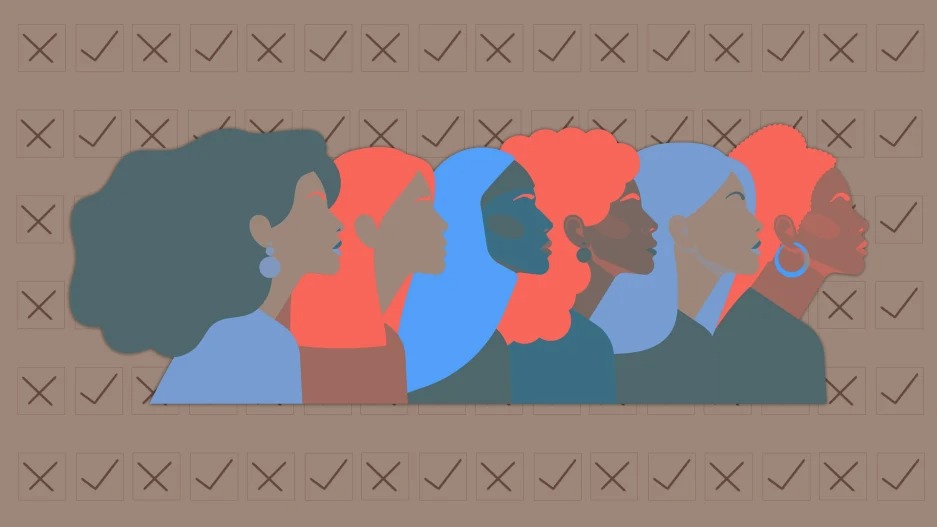- | 1:00 pm
How workplace discrimination has changed over the last generation
In the second episode of the Ambition Diaries miniseries, mothers and daughters share stories of fighting back against racism and sexism at work.

For some people when they hear the words “workplace discrimination,” it calls to mind a bygone Mad Men era of overt sexism and racism. And while that kind of egregious behavior does happen, the discrimination most prevalent in workplaces can fly under the radar for those not experiencing it.
It’s in C-suites that are still 90% white and male; it’s in tone policing and microaggressions; it’s in the persistent gender pay gap; it’s in the motherhood tax; it’s in the hollow corporate statements of inclusion. Inequality has been built on such a strong foundation in all of our workplaces that dismantling it is the work of much more than just one generation. And when the work of dismantling it falls to those without most of the power, doing so can often come at great personal and professional risk.
The stories included in this second episode of Ambition Diaries illustrate all of these issues. Several of the mothers and daughters in this episode talked about being “the only one in the room”—the only woman, queer person, or person of color. In these situations, it can feel impossible to make change.
As one of the subjects, Francesca Polanco, noted, sometimes marginalized groups end up perpetuating the discrimination they’ve faced to survive in toxic cultures. She shared this when talking with her mother, Damita, about the widespread pregnancy discrimination they both witnessed in their corporate jobs. “When you are trained in this kind of structure, you often become a perpetrator yourself,” she said. “For instance, we had one pregnant woman tell her boss that she was pregnant. And just because she had had a baby the year prior, that boss—who was a woman—asked her if she was sure she wanted to keep it.”
For Black women, racism and sexism can not be decoupled. They often face a double whammy of tone policing and stereotyping in the workplace. Many companies started belatedly owning up to their shortcomings in hiring, promoting, and retaining BIPOC employees in the past few years. But, despite $9.3 billion investment in DEI globally in this year alone, change has been slow.
Damita and her daughter Francesca recalled several incidents from their past jobs where they experienced microaggressions and coded racism.
“I remember when I got promoted to director, the very first thing they did was what they called executive coaching and a 360 review,” said Damita. “The feedback was that I was smart but I was intimidating to everybody. And so the feedback for me was to energy match and to basically make myself smaller, so that they could be comfortable, which was wild as hell to me.”
While many of the mothers and daughters we spoke to for Ambition Diaries had stories of being forced to stay quiet or make themselves smaller, there were signs of change. While some of the daughters still faced the same bias as their mothers, they felt more empowered to speak up.
That was true for Nikki Carpenter. Her mother, Tanya Perry, shared a story of being called a racial slur and having the police called on her while working a door-to-door sales job. But where Tanya felt shocked and helpless, Carpenter was raised to feel more empowered in white spaces and stood up to her insensitive boss. After she quit her job due to an insensitive work environment, she reached out to her boss who was posting in support of Black Lives Matter to tell her how she had felt when she worked there. She says:
“I sent (my former boss) an email, and I said, ‘one of the reasons why I had to quit, is because, when my cousin passed away, you wanted me right back at work. Because you said she was not my biological sister. In a Black family, your cousins are your sisters. So, now, you’re saying Black Lives Matter. But if Black Lives Matter, Black culture has to matter.”
The stories of sexism and racism these women share can make the slow pace of progress feel even more pronounced. But within their stories, there is also hope that the balance of power can start to shift, even slightly.
Listen to the full episode to hear more of these powerful stories.
You can listen and subscribe to The New Way We Work on Apple Podcasts, Google Podcasts, Stitcher, Spotify, RadioPublic, or wherever you get your podcasts.







































